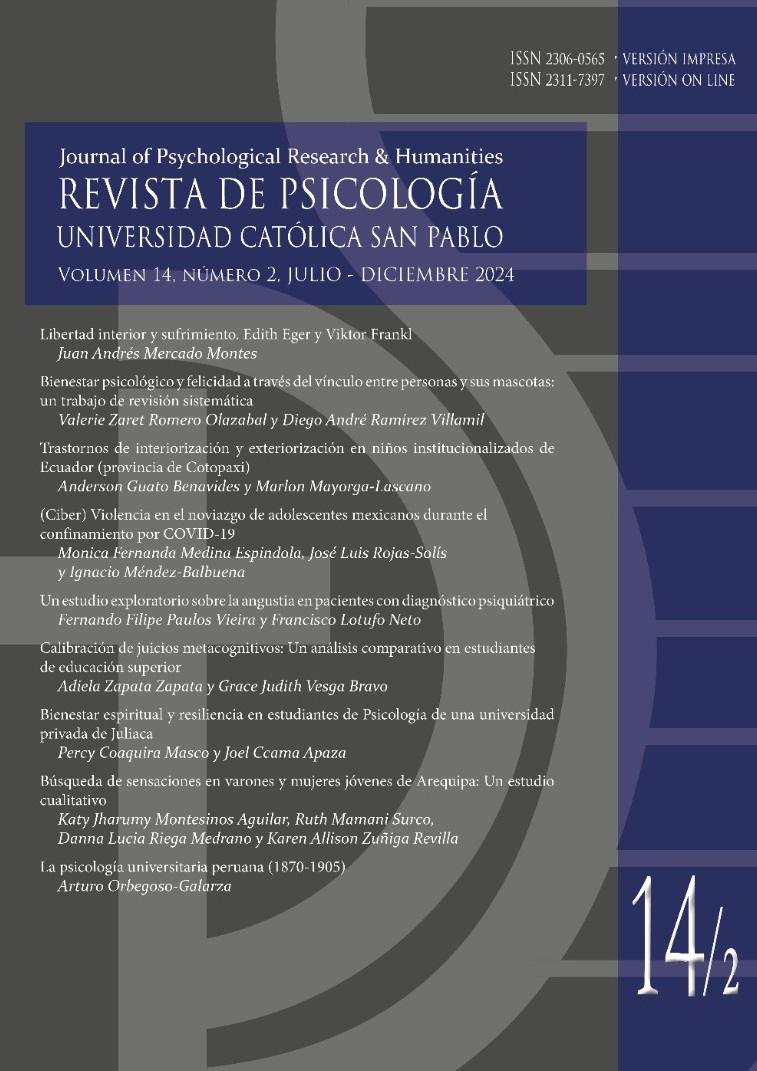Abstract
Edith Eger vividly illustrates the intricate relationship between pain and the ability to reconcile it with personal freedom, emphasizing that in any situation, we can embrace our suffering and continue to strive. “Saying yes to life” is intertwined with finding meaning in it. The works of Viktor Frankl opened Eger's eyes to this reality, where paradoxical elements often negatively impact many people's lives. Frankl and Eger extend beyond psychological description by valuing methods to confront suffering and frustration, delving into profound philosophical concepts, apart from choice and meaning. Eger unequivocally asserts that life is a gift and describes the pursuit of meaning as a personal mission, aligning with an ethical framework centered on the question regarding what kind of person each one wants to be. Within this psychological and anthropological context, the contributions of Leonardo Polo’s concept of proactive synderesis, Tomasello’s spontaneous collaboration, and Peterson’s emphasis on the necessity of discipline, enrich the comprehensive understanding of the perspectives offered by Eger and Frankl.
References
Abbà, G. (1995). Felicità, vita buona e virtù: Saggio di filosofia morale (2a ed.). LAS.
Abbà, G. (1996). Quale impostazione per la filosofia morale? LAS.
Abbà, G. (2018). Le virtù per la felicità. LAS.
Annas, J. (1993). The morality of happiness. Oxford University Press.
Aristóteles (1984). Ética nicomaquea. En J. Barnes (Ed.), The complete works of Aristotle. The revised Oxford translation. Princeton University Press.
Benedicto XVI (2005). Deus caritas est. LEV.
Eger, E. E. (2017). The choice. [edición eBook]. Simon and Schuster, Inc.
Eger, E. E. (2020). The gift: 12 lessons to save your life. [edición eBook]. Simon and Schuster, Inc.
Frankl, V. E. (1991). El hombre en busca de sentido. Herder.
Frankl, V. E. (2024). Gesammelte Werke. www.viktorfrankl.org/books_by_vf.html#German.
Lewis, C. S. (2012). The problem of pain. Harper Collins.
MacIntyre, A. (1992). After virtue: A study in moral theory (3a. ed.). University of Notre Dame Press.
MacIntyre, A. (1999). Dependent rational animals: Why human beings need the virtues. Open Court.
Peterson, J. (2019). 12 Rules for life: An antidote for chaos. Random House.
Polo, L. (2009). Curso de psicología general: lo psíquico, la psicología como ciencia, la índole de las operaciones del viviente. EUNSA.
Polo, L. (2016). Antropología trascendental, en Obras completas, Serie A, v. XV. EUNSA.
Polo, L. (2018). Ética, en Obras completas, Serie A, v. XI. EUNSA.
Polo, L. & Llano, C. (2019). Antropología de la acción directiva, en Obras completas, Serie A, v. XVIII. EUNSA.
RAE. Confrontar (s.f.). Real Academia Española. https://dle.rae.es/confrontar
Sahagún Kunhardt, P. I. (2023). Operari sequitor co-esse: la cooperación como esencia de la persona según Michael Tomasello y Leonardo Polo. [Tesis doctoral]. Pontificia Università della Santa Croce, Roma, Italia.
Sanguineti, J. J. (2024). Dolor. En F. Fernández Labastida & J. A. Mercado (Eds.), Philosophica: Enciclopedia filosófica on line. https://doi.org/10.17421/2035_8326_2017_JJS_1-1
Spaemann, R. (1989). Glück und Wohlwollen: Versuch über Ethik. Klett-Cotta.
Taylor, Ch. (1989). Sources of the self: The making of the modern identity. Harvard University Press.
Tomasello, M. (2019). Becoming human: A theory of ontogeny. Belknap Press-Harvard University Press.

This work is licensed under a Creative Commons Attribution-NonCommercial-NoDerivatives 4.0 International License.
Copyright (c) 2025 Juan Andrés Mercado Montes


